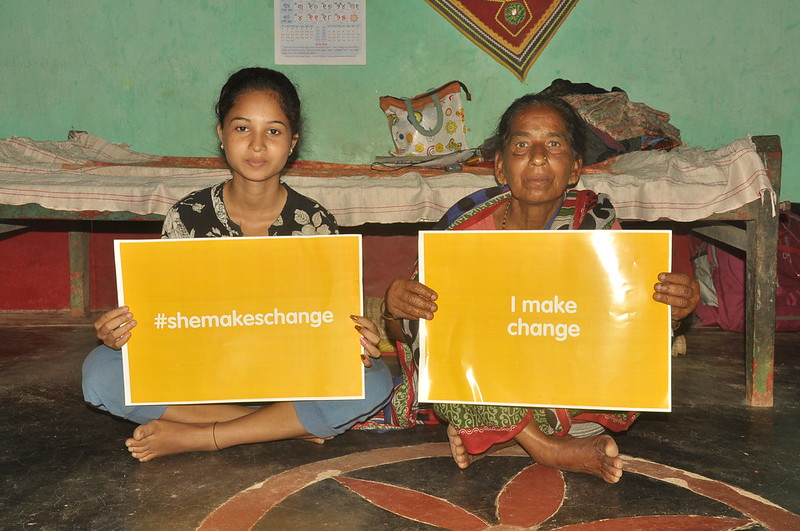
COVID-19 has forced the women in Odisha to postpone the workshops that IRC raised funds for during the 'She Makes Change' campaign.
Published on: 19/10/2020
Photo caption: #Shemakeschange campaign, Ganjam district, Odisha, India. Credit: IRC
Women have more acute needs due to cultural and biological roles, and a lack of services is often at the cost of their health, education, employment and participation in politics and society. Therefore, it is important that women have a say in WASH decision making. On the occasion of International Women's Day on March 8th 2020, IRC raised funds for women to ensure their voices were heard.
The ‘She Makes Change’ campaign successfully raised €2,868.25 for capacity building of women in the state of Odisha in India. The funds will be used to organise a series of workshops to provide foundational knowledge and skills to women in Ganjam district of Odisha, to enable them to assert their rights as citizens and participate in local government decision making.
Originally scheduled to be held in the months of June and July 2020, these workshops have not yet been organised due to the COVID-19 pandemic. The number of corona cases in India has been on the rise since early this year. At 7,307,097, India is currently the country with the second highest number of COVID-19 cases in the world. However, in terms of number of daily cases, it has the highest in the world (on 15 October).
The strict lockdown enforced by the Government of India in March 2020 gave rise to a wave of reverse migration. A significant proportion of the working age population in Ganjam works as migrants in the textile mills of Surat in the state of Gujarat. With the closure of the mills, high rate of infection, loss of employment and poor living conditions in the industrial town, the migrants returned to Ganjam. It is estimated that over a million migrants returned to the district in the pandemic.
The return of the migrants to Ganjam has led to a massive surge in corona cases in the state of Odisha, making Ganjam the non-capital hot spot in July, with a peak of over 700 cases in a day. To date, the district has recorded over 20,000 cases, with 29 confirmed cases in the last 24 hours at the time of writing. The return of the migrants has increased stress on the limited health infrastructure in the district as well as on the resources.
Considering these conditions, the leadership workshops have been postponed to next year. It must be added here that, the pandemic has also reinforced the need for skill training. Handwashing with soap is one of the easiest precautions against the spread of infectious diseases such as COVID -19. Access to improved water, sanitation and hygiene services is thus essential. Therefore, it becomes all the more critical to strengthen the capacities of women and other marginalised sections of the population to effectively plan, make decisions, reach out to and hold duty bearers and service providers accountable, where required, to ensure services for all.
The significance of these skills goes beyond the realm of WASH. They empower women to access more opportunities, enable them to demand for themselves as well as for other marginalised populations. We know that such skills have the power to bring about transformative change.
If you would like to help support this project, or any others, you can make a donation here. Alternatively, contact us for other ways to support the women and marginalised populations in Ganjam and beyond.